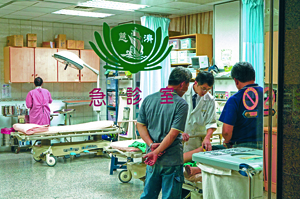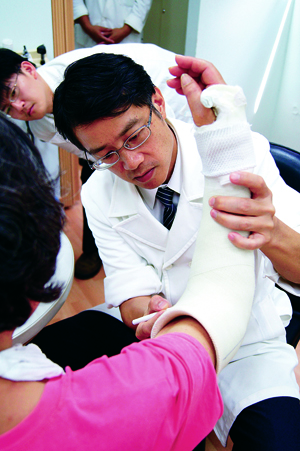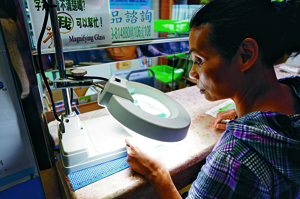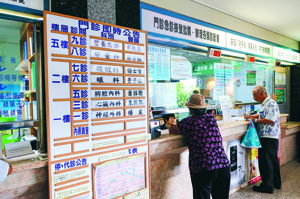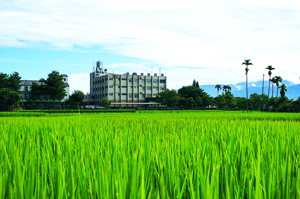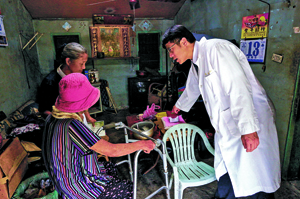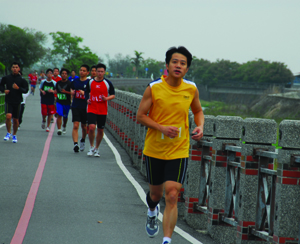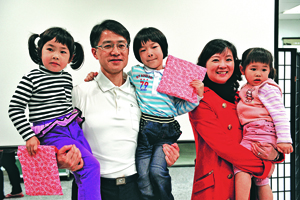

| Putting Down Roots of Love: A Doctor Transplanted | ||||||||||||||||||
| Text and photos by Yang Shun-bin Translated by Tang Yau-yang | ||||||||||||||||||
He grew up in Hong Kong, but for the past 12 years he has been doctoring in Taidong, eastern Taiwan. Although his heavy workload has led to perpetually long days and short nights, he has stuck with it, in just the place where he believes he can do the most good.
At an hour before midnight, Dr. Wing-Him Poon (潘永謙), the superintendent of Guanshan Tzu Chi Hospital, was still in the administrative office area reviewing paperwork that he, as a manager of the hospital, needed to handle. He had gone to his office to do paperwork during a slow time in the emergency room. He was on ER duty for the second time this week. A doctor had quit, and Dr. Poon was filling in until a replacement could be found. He occasionally also substitutes for the Saturday shift if the doctor from Hualien Tzu Chi Hospital cannot show up as routinely planned. Poon is a busy physician. “I guess I’m approaching 96 hours this week,” he said with a wry smile. In addition to his regular work in the orthopedic clinic, he also serves in the ER and operates on patients. He can rest on Saturday and Sunday when things are less hectic, but even then he still works more than 80 hours a week. The main reason for his long work hours is a shortage of doctors in the hospital, which is located in a remote area of Taiwan. Most people live on the west side of the island, but Guanshan is on the relatively undeveloped east side. Few doctors are willing to work here. Even if they do, chances are good they will move on to other positions in two to three years. The difficulty in attracting staff and the high turnover of personnel has been a perpetual problem for the hospital. As a result, Dr. Poon often works in more than one role and puts in long hours. As he reviewed the paperwork, he glanced at the photo of his family on his computer. Though his work is hard, the support of his family and the positive feedback from his patients is enough to keep him going.
Where to serve? Poon came to Taiwan from Hong Kong more than 30 years ago to study at the Department of Medicine at National Taiwan University. He had seen a TV series as a child about how surgeons saved lives. He thought that they were cool and admirable, and that influenced his choice of a career in medicine. “It surely isn’t a bad deal to help people and make a living at the same time,” he said. To satisfy a requirement for students in the last year of med school, Poon interned at the school hospital and elsewhere. His experiences led him to decide to specialize in orthopedics. As an orthopedic surgeon, he’d be able to operate on patients in emergency situations and immediately witness the effects of his work. He liked the challenges it brought. He would be much like the stars in the TV series he had seen long before. Around that time, Poon learned that Hualien Tzu Chi Hospital, outfitted with brand new equipment, had just opened. He also learned that Dr. Chen Ing-ho (陳英和), a few years ahead of him at the same med school and now an accomplished surgeon, was relocating to work for that hospital. Wanting to learn from an old hand, Poon joined Chen at the Tzu Chi hospital in 1991. In early 2002, Dr. Chen, who had by then become the superintendent of Hualien Tzu Chi Hospital, broached a topic while dining with Poon. He told Poon that the orthopedic surgeon at Guanshan Tzu Chi Hospital, on loan from Hualien Tzu Chi Hospital, was near the end of his two-year commitment and would soon return to Hualien. Chen had yet to find a doctor to replace him in Guanshan. “I’m hoping that you, with your orthopedic background and a complete resume in emergency medicine, can take up that post. What do you think?” he asked Poon. Chen expected Poon to hesitate with his answer, but Poon didn’t. He accepted the offer on the spot. He had always wanted to serve in remote and underdeveloped areas. Once Poon had agreed to take the position, all that was left was to set a date. A few days after their conversation, Poon saw a patient in his clinic at the Hualien hospital. He had seen this small girl a year earlier, when he had suggested surgery to fix a broken bone in her right thigh. However, she had not returned to see Poon again until this day. Her condition had grown much worse, and she was unable to bend her right knee. She had walked into the clinic with her father propping her up. As it happened, the family did not want the little girl to be operated on after the first visit out of a misplaced ideological distrust in surgery. Furthermore, it was very difficult for the family to take her to see bona fide doctors from their home far in the mountains, so they had taken the girl to a quack who claimed to be able to fix bone problems. However, one year later now, instead of improving, her condition had gotten a lot worse. By delaying proper treatment, the family had caused the girl to miss the golden window for treatment. The condition of the girl’s leg had deteriorated beyond even the help of modern medicine. Now Poon had to tell the eager but anxious family the best course of action under the circumstances: “You’ll have to wait until she grows up and her skeleton has fully developed. At that time, we can try to secure or replace the joint.” As the downcast family was walking out of the clinic, the girl cried out, “I don’t want to be a cripple!” Her cry caused Poon to reflect on the sorry episode. A simple operation a year earlier could have completely cured the girl’s problem, but now she faced disability. He attributed this tragedy to two factors: Hospitals were too far for people in remote areas, and misconceptions were widespread among people. He had to do something to change this situation, and he could not wait. After talking to his wife, Huang Su-hong (黃素虹), Poon informed Chen the next day of his desire to relocate to Guanshan Tzu Chi Hospital as soon as possible. He started working there in July 2002 as an attending physician in orthopedics.
A second home Guanshan is located in the southern part of the East Rift Valley, in eastern Taiwan, and has a population of less than ten thousand. When Poon first arrived in this remote area, he was excited and eager to serve his patients there. However, his enthusiasm was soon dampened with the challenges he faced. Dr. Wu Wen-tien (吳文田), Poon’s predecessor, had done a very fine job with his patients. As a result, Poon had a tough act to follow. He quickly learned that helping the folks here would take more than he first thought. “I don’t understand what you’re saying,” a patient blurted out, not mincing words. “Dr. Wu was nicer. He talked Taiwanese to me.” Despite the small population, the people there speak a variety of languages: Taiwanese, Hakka, aboriginal languages, and Mandarin. Poon was familiar only with Mandarin, which he spoke with a strong Hong Kong accent. The variety of languages he encountered proved quite challenging to him. He had much to do to meet the expectations of his patients. But one of the things that he could do was give them sincere, heart-felt care. One day, a 119-year-old woman was rushed to the emergency department. The doctor on duty suspected a fracture near the pelvis and consulted Poon. Poon decided that the woman needed surgery. Considering her age, a transfer to a larger hospital for the surgery would be quite risky, so Poon decided to perform the high-risk surgery himself. He completed it in 40 minutes, and it went very well. The day after the surgery, Poon visited the patient in her room. Upon seeing him, the patient held his hand and talked excitedly in Bunun, an aboriginal language. Poon had no idea what she was saying, but her smile was contagious. Through a translator, he learned that she was saying that he was a blessing that her ancestors had sent to help her. Later, he lay down on the empty bed beside hers and showed her how to do rehabilitation exercises. No words were exchanged, but the two of them communicated nonetheless. Thus he added a little credibility to his short resume in his new job and made a dent in the estrangement that stood in the way of his medical service to the people of this town. “Mi ho mi san—How are you doing?” said Poon to a Bunun patient. “How may I help you today?” The longer Poon worked in Guanshan, the more acclimated he became to this small town. When he completed his two-year commitment at the hospital, he could have returned to Hualien and resumed his life there, but he chose to stay. About a year later, in May 2005, Poon was promoted to superintendent. “The superintendent is in the hospital just about every day, year round,” said Gu Hua-mei (古花妹), who has worked in the nursing department in the hospital since its construction. “He works so hard. How can we not be on the ball and do our part too?” Lin Bi-li (林碧麗), Poon’s secretary, pointed out that Poon is easygoing with everyone and is very mindful of employees’ health. At his suggestion, the hospital cafeteria switched from white rice to mixed grains. Poon has also been mindful of the needs of the patients, who are mostly elderly and children, just like the population of Guanshan. He has initiated many services specifically for them. He put up a board in a conspicuous place beside the outpatient registration counter. Using the board, patients can easily locate the floor and room for their clinic appointments. He had a magnifying glass placed by the pharmacy counter to help the elderly see more clearly the directions for their medications. He even fitted a retractable hook on his desk in his own clinic from which patients could hang their purses or walking sticks. Such considerate gestures have won him praise from patients.
And that is not all. “Please use this baby stroller,” Poon said to an elderly person holding a small child. He had placed carriages in the hospital for just such occasions. As jobs are hard to come by in that area, young people typically go out of town to work, leaving their children at home in the care of their parents, the so-called “skip-generation caretakers.” The strollers in the hospital are to help elderly patients like them, so they may see their doctors or do whatever else they need to do at the hospital without having to hold the little ones all the time. Poon’s attention to service has extended beyond the hospital grounds. The town was the first in Taiwan to feature a paved cycling path, which many tourists have taken advantage of to get a little workout while they see the beautiful scenery around the town. However, the influx of bicycles resulted in many collisions and falls, prompting Poon to think about what the hospital could do to help reduce those accidents. That led the hospital to start what would become a periodic workshop in 2005 to promote safe biking practices. The hospital has invited bike renters and government personnel to the workshop, and Poon has been the main speaker. Accidents have gradually decreased over the years since the workshops started.
A conscientious surgeon An automobile accident in 2004 left four people injured. The three most seriously injured, all high school students, were rushed to Guanshan Hospital. Poon, who had just finished an operation, hurried to the emergency room and found that the three all required surgery: a severed arm, a broken thigh bone, and facial lacerations. Xiao-jian (小健) had been thrown out of the car in the accident. His lower right arm had been all but completely severed—only the skin was keeping the forearm and hand from falling off. Judging that he was the one who needed to be treated first, Poon rushed Xiao-jian into the operating room for immediate surgery. It was seven thirty in the evening. Poon scrubbed up for back-to-back operations on the three patients. “Two bones, three nerves, two blood vessels, and more than ten ligaments were broken,” said Poon, recalling the demanding procedure that Xiao-jian needed. “Each one of them had to be reconnected under a microscope for precise alignments. There was no room for error.” A transfer to a larger hospital would have meant delayed treatment and possibly amputation. He was the only surgeon at the hospital capable of conducting the surgery, so he decided to take on the challenge. He believed that he could do it. The big operation began. Seconds and minutes ticked away inexorably as Poon meticulously and microscopically put things back in their proper places. Xiao-jian’s family waited outside, but the wait was getting too long for them. They kept ringing the bell and bombarding the nursing staff with questions: “Is it going all right?” “What’s taking so long?” Finally, Poon finished the last suture for Xiao-jian. It was 10:30 the following morning. They had just been through a 15-hour marathon session. Xiao-jian was taken to the recovery room, but Poon continued to work on the second, and then the third patient. At long last, when he emerged from the operating room, it was 5:30 in the afternoon. He had just operated for 22 hours straight. He had not closed his eyes in 36 hours, but he could not rest just yet. He still had to talk to the three families and bring them up to date. For Xiao-jian, the surgery was over, but the recovery was just beginning. Poon told the boy’s family that he still ran the risk of making less than a hundred percent recovery. “You’re telling us that after that very long surgery, Xiao-jian may still not return to normal?!” the family exclaimed. Instead of launching into a lengthy explanation, Poon smiled and said to Xiao-jian, “You’re still young, so the odds of a good recovery are on your side. Hang in there.” The family was not convinced. They had a fundamental distrust of small hospitals, such as the one in Guanshan. Their distrust came to a head when a nurse was changing dressings for Xiao-jian and they saw wounds that had not been sutured. It was explained to them that, given the long duration of the operation, those wounds had become severely swollen and had to be left open for a few days for them to shrink before they could be sewn up. Such explanations fell on deaf ears. The family demanded that the boy be transferred to a medical center in northern Taiwan. At that much larger hospital, physicians ran tests and examined Xiao-jian carefully. They told him and his family that the surgeon at Guanshan Hospital had done a superb job of reconnecting all the nerves and ligaments, and that he had thus spared the young man an amputation. The doctors were surprised to find out that Poon had done the job by himself, something that would normally have taken several surgeons to do, and he had done it so well. They praised him highly. Xiao-jian’s family realized that they had wronged Dr. Poon. Later they took the boy back to Guanshan Hospital for a follow-up. They apologized to Poon and thanked him for all he had done. In the end, Xiao-jian’s youth and sustained rehabilitation therapy greatly helped him to recover. His arm and hand have healed well without any significant impairment. The twists and turns and the emotional rollercoaster rides in this episode closed on a bright note. Perhaps experiences like this have been part of the pull that has kept Poon in Guanshan.
A new place In the early morning of May 27, 2006, a magnitude 6.3 earthquake struck Yogyakarta, Java, Indonesia. The temblor brought down 260,000 homes while many people were sleeping. More than 5,000 people died and 37,000 were injured. Watching the disaster scenes on television, Poon felt for the victims and wanted to help. When he heard that Tzu Chi was sending medical teams to provide free clinics for quake survivors, he immediately signed up. Having arranged for people to cover his hospital responsibilities while he was away, he went with a team to Yogyakarta on June 3 as the team leader. Another team had gone before them, and Poon’s team would go to replace them. That was his first free clinic trip abroad. “I literally went right into the operating room as soon as we had gotten off the plane and the first team had handed over their duties to us,” he recalled. Team members had to start taking antimalarial pills when they arrived in the country. Side effects notwithstanding, when they saw the long halls in the hospital filled with injured people, all Poon and his teammates could think of was getting to work right away. There were many broken bones to be treated, far too many for the available surgeons, so even patients with open fractures, where the bone is exposed through broken skin, often had to wait days for their turn. Medical workers, including Poon’s team, did the best they could to relieve suffering. They left their lodgings at eight each morning and didn’t return to rest until eight in the evening. During the intervening 12 hours, they were kept busy performing operations. As soon as one patient was patched up, a surgeon would hurry to check the X-rays at patients’ bedsides to see who was in the next most urgent need of attention. Once a decision was made, that patient would head into the operating room. In this way, the surgeons served one patient after another throughout the day. Poon himself conducted 29 operations in the five days that his team was there. In addition to the shortage of medical workers, medical equipment and materials were equally in short supply. A surgeon, while evaluating treatment options for a patient, had to check the availability of the apparatus that his treatment choice would need, such as steel plates. If they were not available, a supplier would be called to immediately deliver the materials to the door of the operating room. The supplier got paid on the spot, and the apparatus would be immediately sterilized and used on the patient. That was by no means an ideal setup for surgery, but Poon was quite at home in such a tough environment. His experience at Guanshan Hospital, a small facility without all the best equipment, had prepared him well for just such a day. Together, the first team and Poon’s team provided medical service at the disaster area for ten days. During that time, they greatly helped the injured. Both teams were on the ground very soon after the earthquake, certainly early enough to properly treat bone fractures, which should be treated as quickly as possible. “It’s fortunate that I work for Tzu Chi so I was able to reach the victims as early as I did,” Poon reflected on the experience. “It would have been a pity if I had missed this opportunity to serve.” In addition to giving timely help to patients, “seeing the adversities some people were facing really brought me to reflect on the blessings that I enjoy.”
Small hospital, big hearts In Poon’s mind, one patient stands out more than any other. He treated her in December 2012, when she was on the verge of death upon arriving at Guanshan Hospital. She was 81 then. She was being treated at a hospital in western Taiwan for pneumonia when she suffered a stroke. Bedsores followed and she deteriorated gradually, losing weight to as low as 28 kilograms (62 pounds). Her family decided to take her home to die. After quite some time, though, she was still hanging on. Her family couldn’t stand to see her suffering, so they took her to Guanshan Tzu Chi Hospital for palliative care. Poon examined her and believed that there was a chance that she might still be saved. He put her through a whole body checkup and actively treated every problem identified. Hydration, blood transfusions, cleaning bedsores, and antibiotics were all part of the regime, and she got better. Poon met with a dietitian and a thoracic physician to plan further treatment for her. He also involved a physical therapist so the patient could undergo rehabilitation and treatment at the same time. They did not forget to carefully tend her sores. Day in and day out the team gingerly looked after her. Seventeen days later she recovered, almost like magic. Her family was overjoyed and took her home. Snatching a hopeless patient from the claws of death lifted the spirits and confidence of the medical team at the hospital, not the least of whom was Poon. He observed that although it was a small hospital and may not have had first-rate equipment or even techniques, “as long as we insist on giving a little extra love and we don’t give up on patients easily, we can take very good care of our patients and save precious lives.”
This small hospital has been home to Poon for the last 12 years. He knows only too well the challenges that the hospital faces in providing emergency services in such a small, out-of-the-way town. Patients do not lower their demand for good medical service just because Guanshan is a small hospital. All sorts of medical conditions may show up in an emergency room. As good as the medical team at Guanshan Hospital is, it cannot handle all of them. There are therefore occasions that necessitate transferring patients to bigger hospitals. However, the nearest large hospitals are 40 kilometers (25 miles) to the south or 130 kilometers (80 miles) to the north. It is therefore not always easy to make a judgment call on when to keep a patient in-house and when to send him to a hospital that is better able to handle the case. If a transfer is made prematurely, the patient incurs extra but unnecessary expenses for the ambulance service. On the other hand, if a transfer is made too late, the patient may miss out on getting more suitable care. Another problem a physician practicing in a small town might face is lack of sleep. Dr. Dong Min-ji (董民基), an anesthesiologist at Yuli Tzu Chi Hospital, about 40 kilometers (25 miles) north of Guanshan, used to support Poon in his surgery quite frequently. He recalled that one day after they had finished an operation, it was already very late at night. Yet after Poon drove him back to Yuli, Poon went back to Guanshan to start another operation and work the day shift. Dong greatly admired Poon for his dedication. “I don’t have any special way to stay alert,” said Poon. “I only think of this as my job and my responsibility, and that mental awareness gives me all the alertness that I need to do my job.” Though there is a lot of pressure and little sleep, he views it as what a surgeon’s job naturally entails. To keep in good shape, he often jogs in his few spare moments early in the morning or after work. That helps him handle the heavy workload. Poon’s dedication in guarding the health of the local community has won him recognition. In 2009 the Lion’s Club presented him with a Contributors to Taiwan Award. In 2014 he received a medical dedication award for individuals from the Health, Welfare and Environment Foundation. Despite the accolades, Poon has always thought of himself as doing nothing more than what is called for, and he credits all his colleagues for the recognition that he has been accorded. “It’s not my personal contributions that have won me awards. It’s the hard work of the one hundred employees at Guanshan Tzu Chi Hospital who work alongside me to serve the people in this back country. All the glory should be theirs.” He continued with a smile, “There are already many physicians in metropolitan areas. Nobody will miss me there. I’ll continue to do my bit in a place like Guanshan, where medical resources are scarce.” When he talks, the slight but indelible accent in his Mandarin still betrays his roots in Hong Kong. But after 12 years in Guanshan, he has given his heart to the small town he continues to guard, day and night.
|













|

